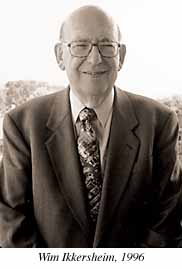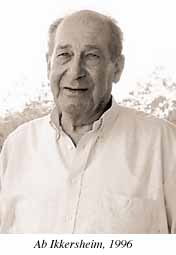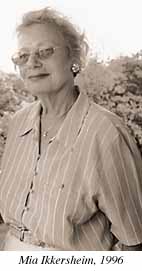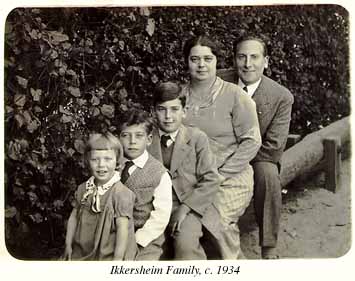 AB: We couldn't return to our old house. It had been turned into a cafe-bar.
AB: We couldn't return to our old house. It had been turned into a cafe-bar.
 The fate of the Jews:
The fate of the Jews:
MIA: For myself, I knew. When I was staying in Laren, close to Huizen, I had to chop wood for the stove. Don't ask me how, but I knew that my friends from school were in heaven and could see me busy with the wood chopping. We must have known something.
AB: We knew what was happening in Amsterdam--the worst city for being picked up by the Germans. Fifty men might be arrested one day, and sent to Poland. Then pretty soon the Germans sent a postcard saying one man died of some disease. The next day a card came saying another one died from a different cause, and another one from some other cause. That was a warning something was going on.
MIA: People in the camps sent postcards with hidden messages. One might say, "I have seen Uncle So and So here." but the family that got the card knew that that uncle had died a long time before. Then they understood that their relative had seen death in Poland.
Starting over after the war:
WIM: After the war, it was the Jews who came back who were perceived to be the problem. We were the problem.
 AB: We couldn't return to our old house. It had been turned into a cafe-bar.
AB: We couldn't return to our old house. It had been turned into a cafe-bar.
MIA: A brewery had put a lot of money into our house and wanted to keep it as a cafe.
AB: Today, we would take two or three lawyers, go to court, and get our rights.
MIA: But we came back and asked, "Please, may we have..." We were too polite to make demands. The war broke us down.
AB: It's strange that we were not able to walk into our own home and kick everybody out. It was our home. It should have been quite easy, but we we didn't have the guts.
Some friends in The Hague took us in for the first weeks.
MIA: We could get a house from an N.S.B'er but when we had a look at it, I did not feel satisfied. I didn't like it. I think my father didn't like it either. He said, "When we get a new house we must all like it.
"What would you think about the house of Uncle Willem and Aunt Annie? That one is empty too."
"Oh, I would love it," I said. We got that house.
My mother was so ill by then, she was in a hospital. But finally, a few months after the war ended, we were able to come and live all together again.
For me the war was simply the experience of being hidden. I was knitting and reading all the time, waiting for it to end. When the war was over, then my biggest problems arose and it was the hardest time of my life. What for other young people was the most wonderful period of their life, was for me the worst.
 My father started up the store again, and the boys went back to school. But my mother was very ill, and I was expected to stay at home to do the housework. I couldn't go back to school.
My father started up the store again, and the boys went back to school. But my mother was very ill, and I was expected to stay at home to do the housework. I couldn't go back to school.
Boys were important. My father paid for my brothers' driving lessons. Not for me. I had to pay for it later myself. I had to study on my own, much later, and pay for it myself. There was a world of difference between their experiences and mine.
And I had a sick mother to care for, day and night. I was in the house even more than during the war. There was no time to go out. We lived in the center of town, and since my mother was ill, everyone came to our house to visit. So there were always a lot of people in and out eating and drinking, a lot of housework.
At the time, I thought it was normal. My mother died in '48. I was years behind in my basic schooling. I had no friends because everyone was gone. The girls and boys my age found their friends again when they went back to school, but I never went back. At age eighteen, I did not have one girlfriend or boyfriend. I hardly knew anyone.
Reflections:
WIM: You went to Amsterdam two years ago.
MIA: Yes, there was a conference organized for the hidden children.
WIM: I didn't want to go.
MIA: Before then, I always thought I was different, but I learned that I wasn't. I found I had a lot in common with people who had had the same experiences. It was very helpful for me. I did not get a chance to tell the group about my problems, because there were so many there who were stronger than I was, especially those from America and Israel, and they did the talking. But that didn't bother me. I let them talk, and I found out we all had the same problem, and there was nothing we could do about it.
I found out that I am not alone. People had always tried to tell me that I was strange, but I learned that I was normal--it was a much better feeling.
I was glad I went, but I wouldn't go to another such conference because it took up so much of my thoughts. I don't want that anymore.
AB: When I reflect upon those times I am amazed at the enormous risk some people took to hide other people. Even today, I can not understand why some people did it. I thought about it many times after the war: would I have done the same if the situation were the other way around? I honestly don't know.
MIA: I feel privileged that my father let us hide. What he did I will never forget. We are very privileged that we are still alive. We owe that to our father. Maybe to our mother too, I'm not sure. I honor them. Both of our parents gave us a chance, and we made it to a good life. I have no children of my own, but my brothers' children are so important for me. With them the Ikkersheim name goes on.

WIM: There were not many families who came back complete.
MIA: We all came back, all together. The war ended and we started again.